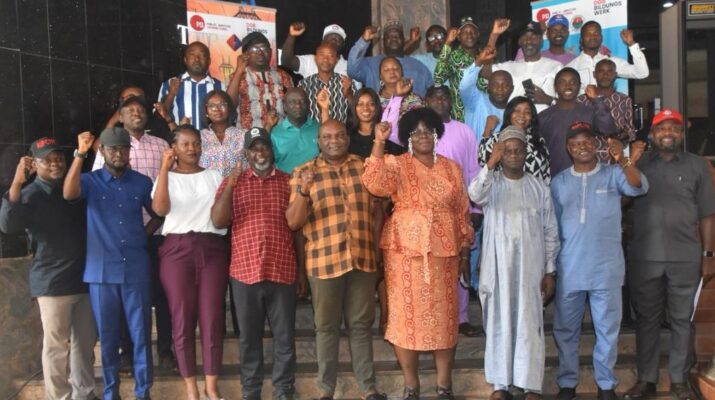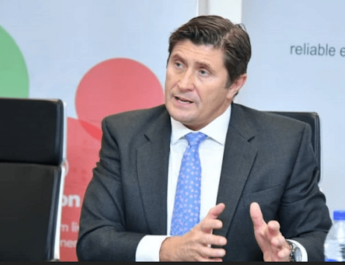As the privatization of electricity, water and waste management continues to falter in Africa and the rest of the world, organized labour unions in Nigeria reject those models and canvass deprivatisation and return to remunicipalisation
By Edu Abade
In their usual dogged and never-say-die manner, organized labour unions under the aegis of the Amalgamated Union of Public Corporations, Civil Service Technical and Recreational Services Employees (AUPCTRE) and National Union of Electricity Employees (NUEE) have restated their opposition to privatization of the power, water and waste services sectors.
The unions and their civil society made the pledge at a workshop in Abuja with the theme: Promoting Transparency and Decent Work in Supply Chains in Electricity, Water and Waste Services in Sub-Saharan Africa, supported by DGB Bildungs Werk and Public Services International (PSI). They also lamented the collapse of the electricity sector post-privatisation, insisting that all previous Memorandum of Understanding (MOU) preceding the handing over of the country’s distribution and transmission companies needed to be reviewed due to their abysmal performance over time.
In his intervention, NUEE Acting General Secretary, Igwebike Dominic, said members of the union are worried due to epileptic power supply, hence the call for reversal of privatization in the electricity sector.
He lamented poor policies and mismanagement of the sector, which he said, continuously affects Nigerians and canvassed an end to casualisation of workers, saying: “All workers must be treated as workers. We must ensure that we team up to stand against unfortunate policies.”
Also, National President of AUPCTRE, Comrade Benjamin Anthony, urged members to unite, insisting that unity is necessary to enable the union to achieve success.
“We need to continuously work together to ensure success. We know that a lot of policies are affecting smooth operation in the sector but we must work together and stand strong,” he said.
He lamented over the consistent collapse of the national grid, saying that those in power might be playing politics to garner resources for elections.
“But we have to play our roles effectively and protect the sector. We must also team up against certain policies that do not augur well for the Nigerian workers. We also need to set an example for our junior ones in the service and encourage the leaders,” he stressed.
In his intervention, PSI-DGB National Coordinator, Comrade Abiodun Bakare, said several engagements with rank-and-file recently in several states across the country revealed a lot of challenges faced by members.
He said the engagement was meant to gauge the pulse of members on the privatization plans of the government, noting that the challenges in the sector needed a collective approach by members to address them, adding: “We need to voice out our feelings on various issues and challenges so that we will unite as a team and face them.”
In her presentation, Comrade Abiodun Badru commended the leaders of the unions for their vision and leadership, while extolling their selflessness in the discharge of their duties to members.
She said the PSI-DGB has been encouraging unions to build solidarity from the Global North to the Global South and mobilizing to defend the rights of workers and the people they provide services to, adding: “We are also building the gap for unions to have the capacity to engage and demand for workers’ rights.”
In his presentation on Campaign Planning and Strategy, Executive Director of Renevlyn Development Initiative (RDI), Philip Jakpor, encouraged members of the unions to build their campaigns on certain questions, which include: What is the situation we want to change? Who is affected by the situation we are advocating? What can we do to improve the situation? What resources are needed? And what tactics are available to implement the campaign? How do we measure success?
Jakpor also stressed the importance of communication plans in a campaign, pointing out that it ensures that the target audience of a campaign gets the message.
He listed the benefits of effective communication to include giving a sense of direction, helps map the audience, helps to identify gaps in policy and advocacy, helps to identify message pillars and helps in evaluation, among others.
Representatives of the unions have also demanded reinstatement of workers unjustly disengaged to pave way for privatization in the electricity and water sectors, as well as full payment of all emoluments due to them and unconditional reinstatement of the 391 employees of the Lagos Water Corporation (LWC) disengaged in April 2024 to enable the state government to actualize its privatization agenda.
The groups, which made the call in their communiqué at the end of a two-day workshop, equally demanded a probe of all water contracts awarded at the national and state levels and a blacklisting of identified contractors who have failed to deliver or diverted the funds.
The two-day event, which held from November 18 to November 19, 2024 featured presentations from experts with the aim of enabling members of the two unions on how to synergize their campaigns, actively and efficiently campaign for workers’ rights.
It afforded participants the opportunity to take a critical look at the electricity sector privatization in Nigeria, purported plans by Federal and some state governments to privatize the water sector and come up with the way forward.
Anthony and Igwebike, who endorsed the communiqué, noted that privatizing public utilities in the electricity, water and waste services sectors have failed globally and, therefore, was no longer sustainable.
Bakare, who echoed the thoughts of his colleagues, said several engagements with the rank-and-file in different states across the country revealed a lot of challenges faced by the union members, hence the convening aimed to gauge the pulse of members on government’s privatisation plans and how best to collectively address the issues.
After extensive deliberations and voting, participants resolved that the transfer of ownership of the National Electric Power Authority (NEPA) and later Power Holding Company of Nigeria (PHCN) to private entities which the Federal Government said would improve efficiency, attract investments and enhance the overall electricity supply in Nigeria has failed.
Lamenting the constant increase in electricity tariffs and decrease in power supply resulting to darkness in most homes, they said the unending collapse of the National grid portends danger to the National economy and increases insecurity which affects businesses in Nigeria.
“We also observed the clandestine attempts to privatize water in Nigeria through various MOUs and Agreements at National and State levels are extremely worrisome and entrenchment of casualization and disengagement of workers in government establishments already privatized and systematic introduction of divisive policies to weaken the unity of workers and their opposition to privatization.
“There is growing abdication of responsibility by state governments who are now adopting Public-Private-Partnerships (PPPs) and poor waste management across the country,” the communiqué added.
The participants, therefore, resolved that there should be total reversal of the electricity sector privatization, review of the unjust tariff on electricity and the oppressive bands structure introduced by the current administration in the most recent tariff hike.
They demanded an overhaul and upgrade of the National grid and protection of electricity infrastructure across the country from vandals, who work in collusion with unscrupulous agents of the state intent on milking the country through contracts for repair works.
They also demanded total stoppage to the planned privatization of the Transmission Company of Nigeria (TCN), a halt to the planned privatization of water through the so-called PPPs and embrace of Public-Public-Partnerships, which have proven to be effective in addressing challenges in the public sector globally, among others.




